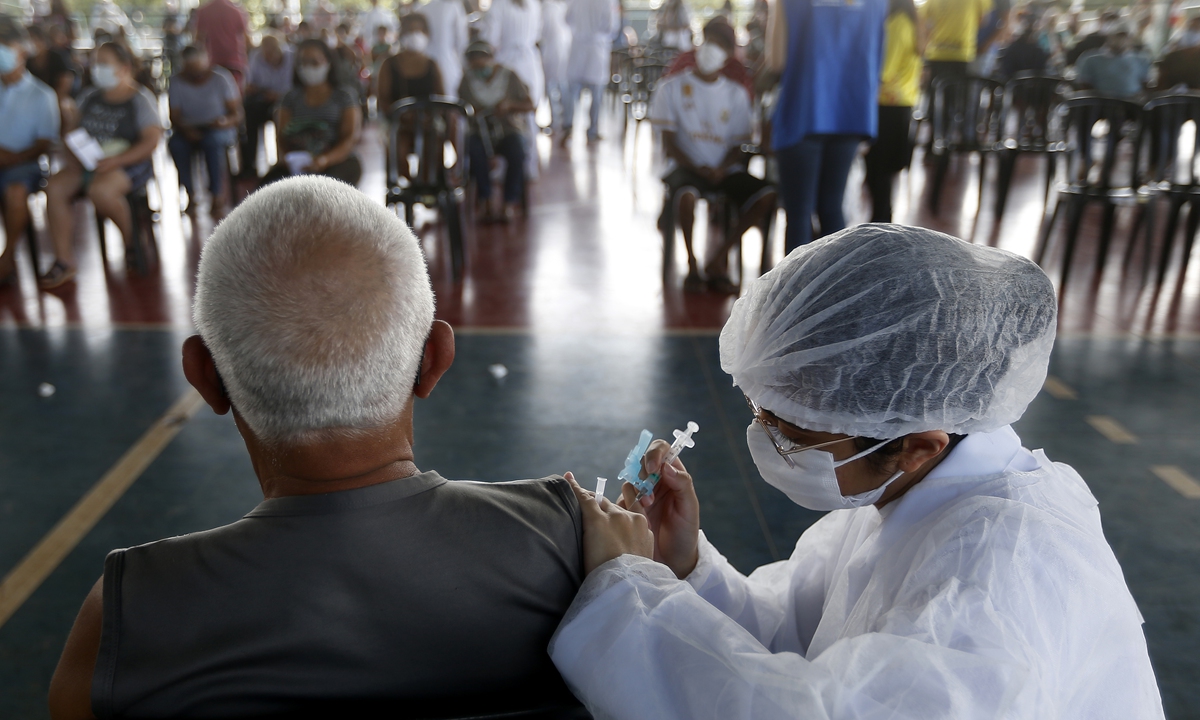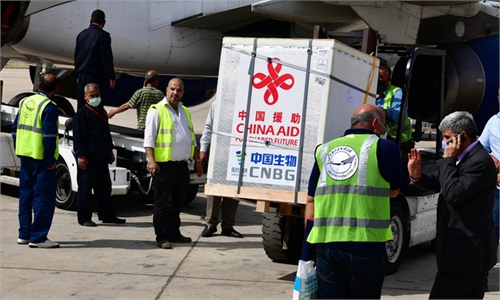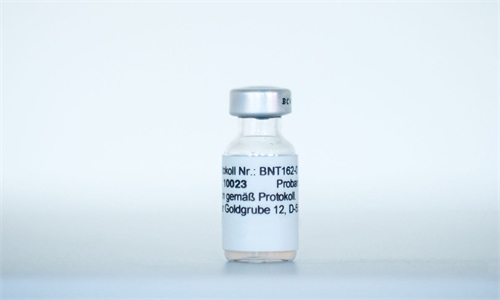US support for vaccine patent waiver 'political tactic,' won't benefit countries lacking production capacity

A man receives China-made COVID-19 vaccine in Brasilia, Brazil. Photo: Xinhua
After the Biden administration announced support on Wednesday for waiving intellectual property rights for COVID-19 vaccines, a sharp reversal from sitting on stockpiles indifferent to other countries' demands, Chinese experts pointed out the attitude change was more a case of crisis management to restore the country's international reputation, and there is little chance that it will be more than "lip service."In response to the US announcement, Chinese Foreign Ministry spokesperson Wang Wenbin said on Thursday that for the accessibility of vaccines, China hopes that under the World Trade Organization (WTO) framework, constructive communications and effective results can be achieved.
China supports efforts to improve vaccine accessibility and is willing to make contributions to promoting accessibility and affordability in developing countries.
The US is one of the wealthy countries and regions - others include the UK and the EU - that previously blocked negotiations at the WTO about a proposal led by India and South Africa to waive protection for some patents and technology, and boost vaccine production in developing countries.
Ten meetings in seven months failed to produce a breakthrough on the proposal, as any easing in the WTO's Trade-Related Aspects of Intellectual Property requires all 164 members' agreement, which remains difficult despite the US' support, as other rich countries not necessarily would follow, observers said.
The US' reversal came amid a large-scale outbreak in India and floods of criticism of the US for its indifference to its Indian partner's sufferings.
World Health Organization head Tedros Adhanom Ghebreyesus called the US' move "a monumental moment in the fight against COVID-19" and "a powerful example of US leadership to address global health challenges."
Western media said the Biden administration was bowing to mounting pressure from Democratic lawmakers and more than 100 other countries by making the reversal, which angered pharmaceutical companies.
Shares in Moderna Inc and Novavax Inc dropped several percent in regular trade following the Wednesday announcement, although Pfizer Inc stock fell only slightly, according to Reuters.
Besides different reactions to the US government stance, the waiver is more like a political tactic that the US is using to restore its ruined reputation, given its previous indifference and negative actions as a major vaccine supplier while many poor countries are in severe need of shots, Feng Duojia, president of the China Vaccine Industry Association, told the Global Times on Thursday.
"The highest priority of the US is to win back public trust, this is the only explanation that I can think of for the US' reversal on the IP waiver," Feng said.
Observers noted the US government can hardly push forward the administrative and legal process of the waiver it proposed.
"The key to vaccine supply is not the patents or technology itself, but manufacturing techniques and the personnel that poor countries lack. So it is difficult for poor countries to actually benefit from the waiver," a Beijing-based vaccine expert told the Global Times on Thursday on condition of anonymity.
The manufacturing techniques of mRNA vaccines are very advanced, especially the techniques to deliver nano-lipsomes and modify nucleic acid, which are difficult even for major vaccine manufacturing countries like China and India at the current stage, the Beijing expert said.
A more plausible model would be directly selling and donating vaccines or helping local manufacturing of the products, experts said.
China has contributed more than 30 percent of global vaccine supply and the ratio continues to increase, according to Feng. Data compiled by Airfinity, a London-based science intelligence platform dedicated to COVID-19, shows that out of the 164 million COVID-19 vaccines the US manufactured up to March, none were exported while the EU exported 42 percent of the 110 million doses it produced by the same month.
China has also been transferring techniques to developing countries, including Argentina, Mexico and Pakistan, and helping them build production lines to enhance local vaccine accessibility, Chinese vaccine producers said.
"Piles of shots are approaching expiration dates in warehouses in the US. Selling these shots to poor countries would do hundred times more good than waiving patents. What could patents bring about to countries that even do not have a production line?" a Chinese netizen commented on China's Twitter-like Sina Weibo.


